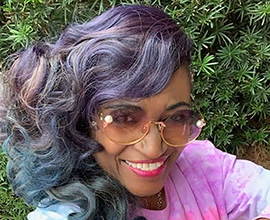- Slug: BC-CNS-Alzheimer’s Impact,800 words.
- 2 photos, video story available (thumbnails, captions below).
By Ariana Araiza
Cronkite News
PHOENIX – Black Americans are two times more likely than whites to develop Alzheimer’s disease and live with missed diagnoses and treatment gaps, studies reveal.
“These health and socioeconomic disparities are rooted in the history of discrimination against Black individuals and other people of color in the United States,” a 2023 report by the Alzheimer’s Association said.
The report says more than 6 million Americans 65 or older live with Alzheimer’s disease, but while 10% of white adults have the disease, the number is 19% for Black adults.
Marion Kelly, a spokesperson for the Mayo Clinic in Scottsdale, said Black people need access to good health care and education about a disease that erodes memory.
“We need to bring understanding to the community,” Kelly said. “If we don’t change the landscape of health for minority communities, the numbers and health outcomes will not change.”
That’s necessary because Alzheimer’s destroys identity, experts say.
Crystal Glover, a Rush University social psychologist and researcher on health equity in aging, said it’s a misconception that memory loss is a normal part of aging.
“Developing Alzheimer’s disease and related dementia takes a toll on your ability to speak, eat, interact with others, and your own behavior,”said Glover, of the Rush Alzheimer’s Disease Center. “It’s an all-encompassing breakdown of who you are, and I don’t think people are prepared for that.”
‘I felt a little cloudy’
Theresa Montgomery, 66, was diagnosed with Alzheimer’s disease at the relatively early age of 58. But she had noticed troubling signs even earlier.
Montgomery, who is Black, said she would buy gifts but forget to give them to loved ones. Her kids teased her.
But the memory gaps changed from amusing to serious. She forgot how to do simple tasks at a job where she had worked long hours for years. The first doctor she visited told her she simply needed more rest.
“What he told me was to come in six months from now, we’ll take it from there and he will give me some tests,” Montgomery said. “He said, ‘Right now, I think you’re doing too much.’”
Montgomery was losing track of time and getting lost, a stranger to surroundings that once were familiar.
“I just felt a little cloudy,” she said.
Montgomery persisted in asking her doctor for help, and a neurologist finally diagnosed her with the early stages of Alzheimer’s. But her troubles continued. She didn’t get much information or advice other than to retire and resign herself to taking medication that might slow the progression of the disease.
“On receiving that news I was like, ‘That’s it, I just take some medicine and I may die within three to five years,’” Montgomery recalled.
“When you get that diagnosis you leave with no hope because you don’t know what you’re going to do, you just know you’re going to die and you eventually will not know who you are.”
Montgomery, who lives in Georgia, decided she wanted to bring awareness to other African Americans with dementia and advocate for their right to be heard. She volunteers for an Alzheimer’s chapter.
“You have to prove to them that you are worthy of life and being saved,” said Montgomery, who said her memory works best earlier in the day. In her community, she said, “there isn’t enough information. We need education in the community on what the disease is.”
Diagnosis, treatment gap for Black men with Alzheimer’s
Medical experts say there is an even bigger gap in researching, diagnosing and treating Black men.
Kinsey McManus, programs director for the Alzheimer’s Association Desert Southwest Chapter, said there is more work that needs to be done to “really understand Black men’s brain health.”
“A lot of research predominantly has women involved,” McManus said. “The statistics right now show 70% of research participants are women.”
Anthony Gathers, owner of Ageez Barber Shop in south Phoenix,uses his shop to advocate and educate for better health. He was a panelist for the second annual Black Men’s Brain Health Conference in Tempe in February.
“You build relationships within your shop so they’re more apt to listen to you about going to get some help, and doing something about your health,” Gathers said.
Gathers said Black men can lack trust in doctors and fear finding out that something is wrong with their health.
“Everybody’s tough and strong, they don’t want to show anything because sometimes it’s looked at as a weakness,” Gathers said. “Traditionally, we weren’t always taught to go to the doctor, we didn’t have the resources.”
So he brings in nurses from the local chapter of the National Black Nurses Association to take people’s blood pressure, offer COVID-19 testing and depression forums, as well as other community activities.
“We can help our community, we can get ahead of it and we can educate each other so we can be a better community within the Black community,” Gathers said.
For more stories from Cronkite News, visit cronkitenews.azpbs.org.
^__=
Theresa Montgomery is one of more than 6 million Americans 65 or older living with Alzheimer’s disease. (Photo courtesy of Theresa Montgomery)
Theresa Montgomery, 66, was diagnosed with Alzheimer’s at the relatively early age of 58, but had seen troubling signs even earlier. (Photo courtesy of Theresa Montgomery)

